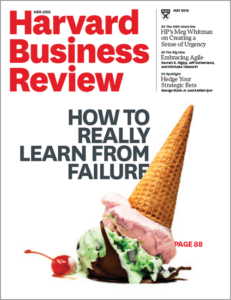 The cover of the new May issue of Harvard Business Review is titled “How to Really Learn From Failure.” In the article, the authors suggest three disciplines of making sure that you can “Increase Your Return on Failure.”*
The cover of the new May issue of Harvard Business Review is titled “How to Really Learn From Failure.” In the article, the authors suggest three disciplines of making sure that you can “Increase Your Return on Failure.”*
Do you do an “After Action Review” at the conclusion of every project? This is highly recommended. When you do it, make sure to point out the positive aspects of the project and the things that could have been done better. Don’t fall into the trap of just ignoring failures or being embarrassed about them. Here are the three tips from the HBR authors:
- Learn from Every Failure. While it can be painful to look back, we need to discipline ourselves to do this even if we are very disappointed. Pixar’s President, Ed Catmull, is quoted in the article: “Mistakes aren’t a necessary evil. They aren’t evil at all. They are the inevitable consequence of doing something new . . . and should be seen as valuable.”
- Share the Lessons. Get over the embarrassment factor. Set aside a time at staff meetings to share what people have learned from failures or setbacks. If you are a larger organization, perhaps consider a place to post these electronically or on an intranet. The HBR authors suggest Triple F Reviews: do them Fast, Frequently, with a Forward-looking focus on learning.
- Review Your Pattern of Failure. Every now and then sit back and review at your list of failures as a whole and look for patterns. Are there flaws in your decision-making processes? Consider whether your failure rate is too high or too low? If it is too high then maybe you need to add some more conservative team members who will help critically review options. Or maybe you need to add more risk-takers if your failure rate is too low. Without some failure, there will be limited learning and innovation.
If you practice these disciplines of engaging failure from a positive perspective you will improve your “Return on Failure” and make even more of a Mission Impact.
*J. Birkinshaw & M. Hass, “Increase Your Return on Failure,” Harvard Business Review, May 2016, pp. 90-93.